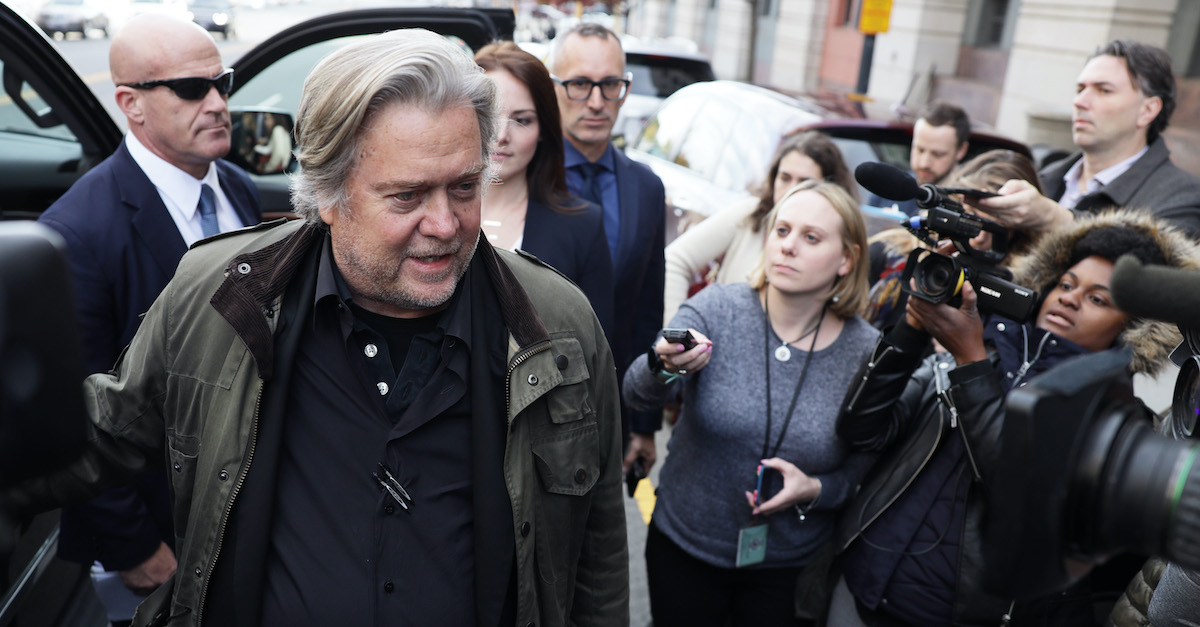
The Select Committee to Investigate the Jan. 6 Attack on the U.S. Capitol announced plans on Tuesday to initiate proceedings to refer former President Donald Trump’s former chief strategist Steve Bannon for criminal contempt for defying the panel’s subpoena.
“Mr. Bannon has declined to cooperate with the Select Committee and is instead hiding behind the former President’s insufficient, blanket, and vague statements regarding privileges he has purported to invoke,” the committee’s Chairman Bennie G. Thompson (D-Miss.) wrote in a statement. “We reject his position entirely. The Select Committee will not tolerate defiance of our subpoenas, so we must move forward with proceedings to refer Mr. Bannon for criminal contempt. I’ve notified the Select Committee that we will convene for a business meeting Tuesday evening to vote on adopting a contempt report.”
Like several former Trump officials, Bannon asserted the former president’s claims of executive privilege, which traditionally applies to sitting presidents. President Joe Biden rejected Trump’s privilege claim over documents sought by the committee on Wednesday.
“The Select Committee will use every tool at its disposal to get the information it seeks, and witnesses who try to stonewall the Select Committee will not succeed,” Rep. Thompson wrote in his statement. “All witnesses are required to provide the information they possess so the Committee can get to the facts. We’re grateful to the many individuals who are voluntarily participating and to witnesses who are complying with subpoenas, including several who met the deadline to begin producing materials to the Select Committee. We’re moving ahead quickly to get answers for the American people about what happened on January 6th and help secure the future of American democracy.”
The committee also recently subpoenaed various participants of the so-called “Stop the Steal” movement, including Ali Alexander.
Those who “willfully” refuse to provide testimony or documents subpoenaed by Congress can be held liable for contempt of Congress, a crime punishable by a fine and between one and 12 months of imprisonment. The committee says the process begins with a “formal action” during which the panel can vote to adopt a contempt report.
If it does, it is referred to the Democratic-dominated House of Representatives for a vote, and should that body adopt it, Speaker Nancy Pelosi (D-Calif.) would certify it for the U.S. Attorney’s office for the District of Columbia. According to the relevant statute, that prosecutor’s office would have the “duty” to “bring the matter before the grand jury for its action.”
Despite the seemingly mandatory language, the Congressional Research Service reported that the Justice Department historically viewed such a referral as advisory.
“It remains unclear whether the ‘duty’ of the U.S. Attorney to present the contempt to the grand jury is mandatory or discretionary,” the agency’s 2017 report states.
Bannon, whom Trump pardoned during the twilight of his presidency in a multi-million dollar border-wall fraud case, is hardly the only ex-official of the previous administration attempting to assert the cloak of privilege. Earlier this month, Politico revealed that Trump urged several former advisers against cooperation in a letter to ex-chief of staff Mark Meadows, former Defense Department official Kash Patel, ex-social media czar Dan Scavino and Bannon.
According to the Washington Post, the letter reportedly claimed that the disclosures were protected “from disclosure by the executive and other privileges, including among others the presidential communications, deliberative process, and attorney-client privileges.”
Last week, the Jan. 6 Committee indicated that Meadows and Patel engaged with them—but Bannon had not.
“While Mr. Meadows and Mr. Patel are, so far, engaging with the Select Committee, Mr. Bannon has indicated that he will try to hide behind vague references to privileges of the former President,” the committee said on Oct. 8.
That statement, crafted on a bipartisan basis by Chairman Thompson and Vice Chair Liz Cheney (R-Wyo.), also warned “we will not allow any witness to defy a lawful subpoena or attempt to run out the clock, and we will swiftly consider advancing a criminal contempt of Congress referral.”
(Photo by Alex Wong/Getty Images)